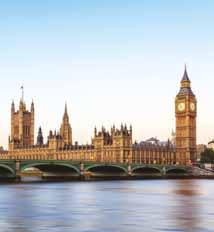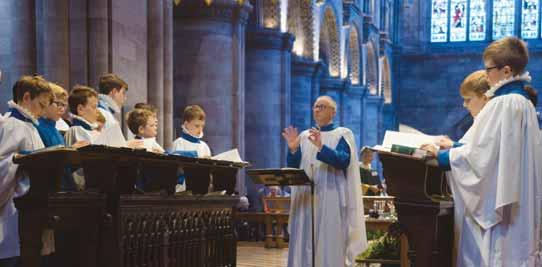
6 minute read
News & campaigns
ISM lobbies for extension of the Self- Employment Income Support Scheme
On 06 July the government announced a £1.57 billion rescue package to protect arts, culture and heritage industries. On 29 July further detail on the grant application process for a Cultural Recovery Fund was announced by Arts Council England. We welcome additional financial support for cultural organisations, many of which are on the verge of collapse or have already closed. However, we remain concerned that there is still no plan to provide longterm financial support for freelancers, who make up most of the music sector workforce and whose livelihoods have ground to a complete halt due to COVID-19. Read our full response to these announcements and why we are continually calling on government to extend the Self-Employed Income Support Scheme (SEISS) at least until the end of the year. ism.org/news/ism-responds-arts-councilcultural-recovery-fund-grants and ism.org/news/ ism-welcomes-government-arts-investment You can add your support by using our template letter to write to your MP asking them to support an extension of the SEISS. Access our template letters here ism.org/blog/ write-to-your-mp-about-extending-the-seiss More information on what you can do to take action and effectively engage your local MP can be found here ism.org/blog/learn-to-lobby DCMS Select Committee releases its report, ‘Impact of COVID-19 on DCMS sectors’
On 23 July, the Digital, Culture, Media and Sport (DCMS) Select Committee in the House of Commons released its report on the impact of COVID-19 on the DCMS sectors. MPs on the Committee said the COVID-19 crisis presents the biggest threat to the UK’s cultural infrastructure, institutions and workforce in a generation. The government was ‘too slow’ to respond to the needs of the DCMS sectors during the COVID19 outbreak with many organisations facing an ‘existential threat’ to their survival, say MPs. In the wide-ranging report, the DCMS Committee found that ministers consistently failed to recognise the scale of the challenge that COVID-19 presents to culture, sport and tourism. We welcome that the committee adopted many of ISM’s policy recommendations to government, including targeted support for freelancers through the extension of the Self-Employment Income Support Scheme, long-term cuts to VAT on ticket sales, and a clear and conditional timeline for reopening.

The ISM responded to the DCMS Committee call for evidence on the impact of COVID-19 on the DCMS sector. You can read the full submission here ism.org/ images/files/ISM-submission-impact-of-COVID19-on-DCMS-sectors.pdf Our key asks for government are also outlined in our recent COVID-19 manifesto here ism.org/blog/ ism-covid-19-manifesto
ISM calls on religious leaders to save the jobs of church and synagogue musicians
The ISM wrote to the Archbishop of Canterbury, the Archbishop of Westminster, and the Chief Rabbi on 8 July, calling on them to protect the jobs of musicians who work in churches and synagogues across the country. The ISM has worked behind the scenes for many weeks to ensure that musicians who work in religious settings do not lose their jobs. In the letters, ISM Chief Executive Deborah Annetts implored religious leaders to take ‘immediate, practical action to save jobs and support musicians’, and criticised the ‘precipitate’ casting of individuals into unemployment in the middle of a pandemic. The ISM is calling for an immediate halt to redundancies to secure the livelihoods of musicians working in religious settings and the maintenance of our ‘glorious choral tradition’. You can read our letters to the religious leaders here ism.org/news/ism-letters-to-religious-leaders ISM publishes global review of research on COVID-19 transmission within performance and music education
On 15 July the ISM published a global study which reviews the current research concerning COVID-19 transmission in the performance and music education space. The study was commissioned by the ISM to collate the extensive information available, provide further clarity on the transmission pathways of COVID-19, and to share this knowledge with the wider music community. You can read the full report here ism.org/ images/files/ISM-Literature-Review_July-2020_ online-FINAL.pdf

Left: Hereford Cathedral Choir photographed in 2017 Photo credit: Ash Mills
Read our feature 'Back to School 2020 – what's different' by Professor Martin Fautley on page 10
Photo taken prior to the COVID-19 lockdown Research on the risk of singing and brass instruments in transmission of COVID-19
Declan Costello, an ENT (ear, nose and throat) surgeon and tenor, is heading up critical research with aerosol specialist Jonathan Reid, a Professor of Chemistry at Bristol University, into how dangerous singing and playing woodwind and brass instruments may be in the spread of COVID-19. The research being conducted by Costello, Reid and colleagues is funded by the Department of Digital, Culture, Media and Sport (DCMS) and sponsored by Public Health England. The aim is to find out how the number and size of droplets and aerosol particles generated by singing and playing compare with those produced by speaking and other forms of vocalisation, such as coughing. The current government guidelines, issued for the nation in August specifically forbid amateurs to sing ‘in groups or in front of audiences’, while professional musicians in England have been allowed to return to work, in carefully controlled circumstances. Permission to perform indoors to socially distanced audiences in England from 1 August had been granted, but was withdrawn under revised guidelines on 31 July, following a spike in cases of COVID-19. The hope is that the study will result in a further unlocking of singing and playing of brass and woodwind instruments, with results set to be published before the end of August. We will keep our members updated on the results of this research. APPG for Music focuses on key issues facing classroom music education and Music Education Hubs in England as a result of COVID-19
The APPG (All-Party Parliamentary Group) for Music Education had its first meeting of the year on 14 July. The meeting was originally scheduled for March but was postponed due to COVID-19. Over 100 individuals, including MPs and music sector organisations, attended the virtual meeting. The APPG included presentations from academics Dr Alison Daubney and Duncan Mackrill from the University of Sussex, who spoke about the impact of COVID-19 on classroom music education. John Bergin, CEO of Newham Music and Sue Beckett, CEO of Portsmouth Music Hub spoke about key issues facing Music Education Hubs in England and what the future holds, as well as the need for long-term funding. ISM Chief Executive Deborah Annetts concluded the meeting and discussed the need for clear core messages around the importance of classroom education. She urged those involved in classroom education to work with the ISM to get the message right on why classroom education matters, so that it is not marginalised as a result of COVID-19. There is concern that COVID-19 could lead to the further prioritization of core subjects, at the expense of a broad and balanced education for children, with music education at its heart.
#CanDoMusic campaign

On 11 August, the ISM launched the #CanDoMusic campaign, in partnership with Music Mark and the Music Teachers’ Association (MTA). #CanDoMusic is a UK-wide campaign that aims to ensure all children and young people can resume their musical learning this autumn. It offers practical teaching resources, advice and guidance on how to adapt to the ‘new normal’, advice and guidance on online teaching (should further localised lockdowns happen), and information to help individuals and organisations advocate for music in school. Its mission is to celebrate and unlock the innovation of music teachers and senior leaders, ensuring that music plays a central role in rebuilding their school communities.
External affairs team , 020 7313 9312







